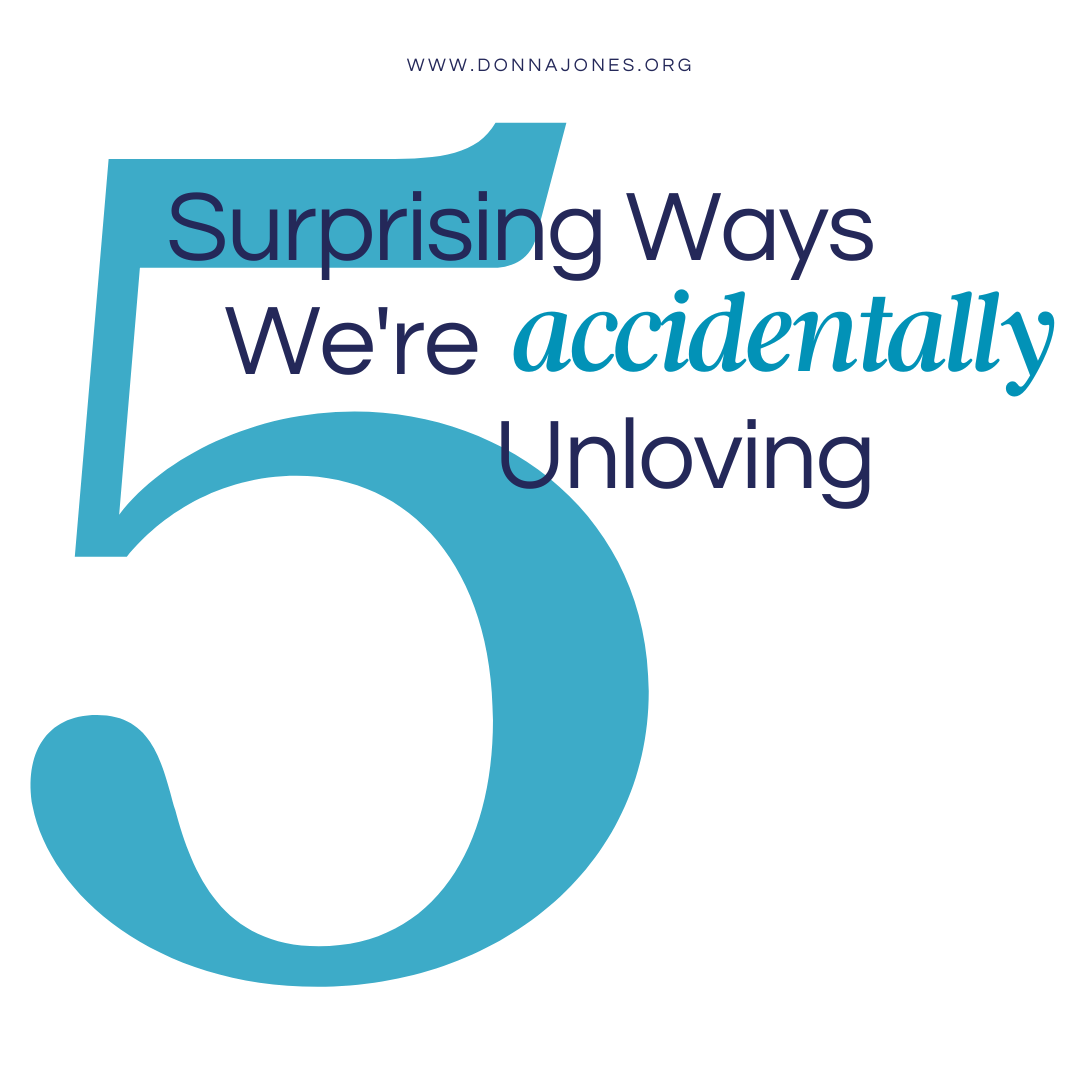Welcome Friend!
You don’t want to be unloving, in fact, you want to be more loving–am I right? Sometimes, though we accidentally do things that, at first glance, don’t seem particularly unloving, but upon further reflection, actually are. Read on to find out about five surprising ways we’re accidentally unloving. (note: this is not just for parents, it’s for all of us!)
I once asked a gentleman seated next to me on an airplane this question: How many parents in America love their children?
He looked confused. “Is this a trick question?” he wondered.
I assured him it was not.
“Close to 100%, I suppose.”
I nodded in agreement, then asked one more question.
“If I polled children in America and asked, ‘Do you feel loved by your parent?’, what would you guess?”
“Wow. I get your point.” he conceded.
The implication is clear–and not just for the parent/child relationship, but for ALL our relationships–sometimes the feeling we feel doesn’t translate to the feeling others feel.
And that’s a problem.
Especially because loving others is the second greatest commandment. “Love your neighbor as yourself.” (Mark 12:31)
We avoid relationship messes when others receive the message, “You matter to me.” This means we need to: 1) send the message and 2) send the message in a way the other person will receive it.
In his classic book, Dr. Gary Chapman explores the 5 Love Languages (if you haven’t read it, you should!). Every person has their own way of expressing and receiving love–their own love language.
But there are other ways our love doesn’t translate, even when we want it to. None of us wants to intentionally fail to love or be unloving. Often our relational messes happen by accident, simply because we aren’t aware.
Here are Five Ways We’re Accidentally Unloving:
1. We Don’t Show Up
How often have you heard someone say, “You were there for me”? Showing up matters.
Our presence (both physically and emotionally) says, “Nothing else is more important than you.” Our absence says, “Something else is more important than you.”
It’s easy to couch our absences by telling ourselves, they’ll understand. And yes, they’ll understand occasionally. But, over time, our loved ones may start to understand something else: you don’t really care about me, much less love me.
Let’s ditch the cell phone and the unnecessary duties and show up.
2. We Don’t Show Interest
This is related to number one but slightly different. We fail to show interest in a thousand accidental ways:
- We dismiss concerns as silly or irrelevant.
- We forget to ask about important events.
- We don’t really listen.
- We talk more than we should.
- We’re distracted
- We’re occupied by our own concerns, needs, and desires.
- We don’t pitch in and help.
- We neglect to call or text.
Years ago I learned a valuable piece of relational insight that truly communicates love:
If it’s important to you, it’s important to me.
3. We Don’t Respect Boundaries
When others need space to rest, reflect, or refresh and we don’t let them, we’re essentially saying, “I don’t care about you. I care about me.” When others communicate their needs or desires and we dismiss them or ignore them, we’re communicating a lack of love, too.
I’ve known people (you know them, too) who don’t take no for an answer. While this has its merits in certain contexts, it can actually be a subtle form of selfishness, manipulation, or control–none of which are loving.
This can be obvious; “It will really put me out if you say no.” “If you don’t do it, who will?”
Or it can be more subtle; “I know you didn’t want me to, but…”
When we don’t respect other people’s boundaries they won’t feel valued because, frankly, they aren’t.
4. We Don’t Say the Good Stuff
Most of us don’t need more criticism we need more encouragement!
I was surprised to learn that the most important indicator of job satisfaction is, “I feel appreciated.” What’s true at work is true at home, in friendships, and in all our relationships.
And, I’m going to be honest here: in our closest relationships, many of us focus more on what we don’t like than what we do like. In the words of Julia Roberts in Pretty Woman: “Big Mistake. Big, big mistake.”
And, while we’re on the topic, the words “I love you” (or “I’m so glad we’re friends”, “You’re a great kid!” or “You’re the best husband.”) can never be said enough.
People need to hear it, so we need to say it.
5. We Forget to Show Affection
Fact: people need the equivalent of four big hugs a day to be emotionally healthy.
The importance of physical touch can’t be overlooked. I’m reminded of the compassion of Jesus when he touched the leper to heal him when he could have simply spoken the words, “Be healed.” Or when Jesus allowed children to sit on his lap, the bleeding woman to touch his robe, or doubting Thomas to touch His nailed scarred hands.
Human beings require affection for emotional connection.
So, reinstate the hug. Give someone a “high-five.” Rub your child’s back. Give your spouse a big kiss. Shake hands. These are simple, subtle ways we say, “I see you and you matter to me.”
Oh…and if I’ve neglected to let you know how much I value YOU, let me say it now: You matter to me.
You are loved,
Donna
PS. Did you know I have a new podcast episode that comes out every Wednesday? You can listen to the “That’s Just What I Needed” podcast on all your favorite platforms. I’ve had some GREAT guests lately and some solo episodes, too. We’ve discussed everything from “10 Signs of a Confident Woman” to “Gossip” to “Navigating Life Change” to “Breaking Free from Lies”. I’m certain you’ll find an episode where you’ll think, Wow. That was just what I needed!
And if you don’t already follow me on social media, let’s connect!!! You’ll find me at @donnaajones or Instagram or Donna Jones, Speaker & Author on Facebook.
xo,
Donna


